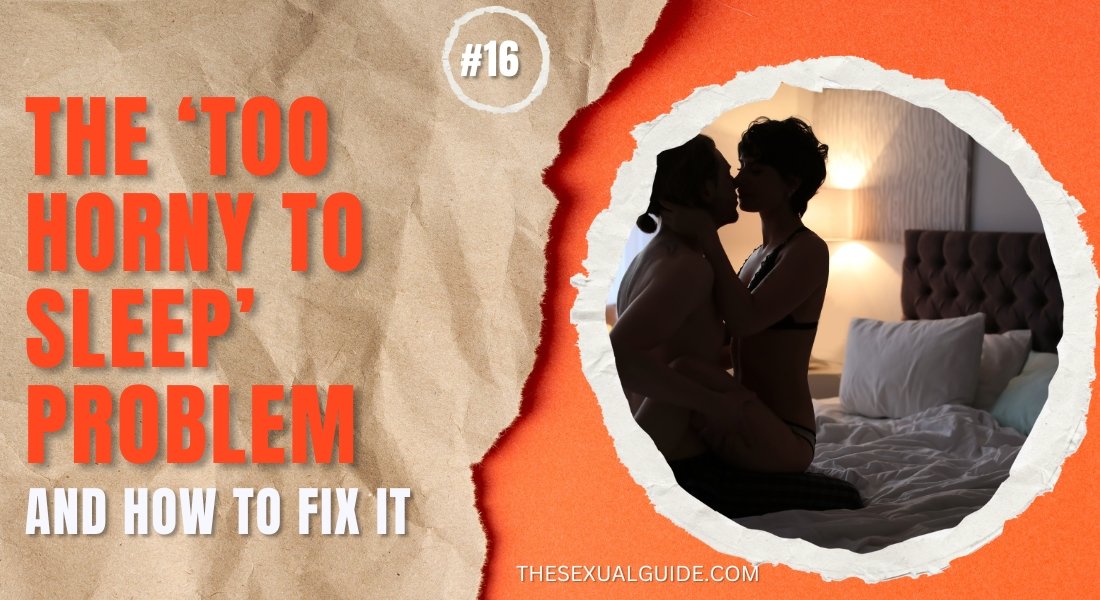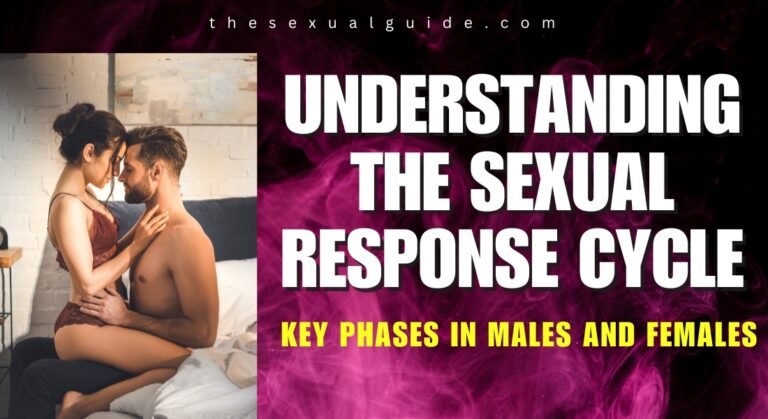Getting a good night’s sleep can sometimes feel like an impossible task, especially when you’re lying in bed, wide awake, and your mind is racing with…let’s say, other thoughts.
If you’re dealing with being too aroused to sleep, you’re not alone. Many people find themselves tossing and turning at night due to sexual frustration, heightened libido, or even the physiological effects of erectile dysfunction (ED).
But don’t worry, this problem can be managed, and there are solutions to help you sleep soundly without the buzz of intense desire keeping you up.
Why Am I Too Horny to Sleep?
Before you start blaming the moon, there’s actually a solid reason behind why you’re too aroused to catch those Z’s.
The connection between sexual desire and sleep isn’t just a coincidence, it’s rooted in our biology. Let’s break it down.
The Role of Testosterone and Hormones
Testosterone plays a key role in sexual arousal and libido.
For many men, testosterone levels peak during the evening and early night, which might explain why you’re feeling the urge to get it on right before bed.
As your body naturally increases testosterone production, your sexual drive can spike, making it difficult to relax and drift off to sleep.
- Testosterone: The hormone that drives sexual desire, with peaks in the evening.
- Dopamine: Released during sexual excitement, dopamine can keep you alert and restless.
If you’re struggling with erectile dysfunction (ED), hormone imbalances could also be at play.
A lack of control over your libido and sexual function might lead to frustration, which in turn affects your ability to sleep.
Psychological Factors
It’s not just about hormones. Psychological factors such as stress, anxiety, or sexual frustration can exacerbate the feeling of being “too horny to sleep.”
If you’re having trouble with ED or any other form of sexual performance, it might cause frustration or anxiety that keeps you up at night.
- Stress and anxiety can elevate cortisol levels, making it harder to sleep and increasing arousal at inappropriate times.
- Sexual frustration caused by difficulty achieving or maintaining an erection (ED) can create a heightened sense of desire without the release of satisfaction.
Other Contributing Factors
There are also external factors that could be contributing to your late-night arousal.
For example, watching stimulating content before bed, taking certain medications, or being in an especially passionate relationship can all lead to feelings of sexual restlessness that make it hard to settle down.
Tips for Managing the ‘Too Horny to Sleep’ Problem
It might seem like a frustrating issue, but there are plenty of strategies you can use to manage it. Some are pretty straightforward, while others may require a little creativity.
1. Release the Tension (Sensually, of Course)
Sometimes, the best way to deal with being “too horny” is to take matters into your own hands.
Masturbation or engaging in intimate activities with a partner can help release that built-up sexual tension, allowing you to finally relax.
- Masturbation: A quick, effective way to relieve the tension, calm your mind, and help you fall asleep.
- Intimate activity with a partner: If you’re not alone, connecting physically can help both of you unwind and enjoy a restful night’s sleep.
2. Practice Relaxation Techniques
If you’re feeling frustrated or mentally charged, a few relaxation exercises could help tone down your arousal. Consider trying the following:
- Deep breathing: Taking slow, deep breaths can help activate your parasympathetic nervous system, which can counteract arousal and induce relaxation.
- Progressive muscle relaxation (PMR): This technique involves tensing and then relaxing your muscle groups to ease physical tension, which might help you settle down.
3. Avoid Stimulants Before Bed
If you’re used to watching exciting or sexual content right before bed, it’s time to cut that out.
The stimulation from visual or mental imagery can boost dopamine levels, making it harder to fall asleep.
Try avoiding the following in the hour or two before bedtime:
- Sexual content: Watching or reading sexually stimulating material can be the worst culprit.
- Caffeine: A stimulant that can make it difficult to wind down, even when you’re physically exhausted.
4. A Comfortable Sleep Environment
Sometimes, your sleep space isn’t conducive to relaxation. Make sure your room is as relaxing as possible:
- Dim the lights to promote melatonin production.
- Keep the room cool to help signal to your body that it’s time for rest.
- Use calming scents such as lavender or chamomile to induce sleepiness.
5. Consider Erectile Dysfunction Solutions
For men experiencing erectile dysfunction, the heightened sexual frustration can contribute to this “too horny to sleep” feeling.
In these cases, it’s crucial to seek solutions that can help regulate libido and reduce anxiety.
One option is LibidoDepot, which offers a range of trusted ED solutions.
Their products help manage and address issues like erectile dysfunction, premature ejaculation, and low libido, allowing you to feel in control of your sexual health and minimize late-night arousal problems.
How Erectile Dysfunction (ED) Affects Sleep
Erectile dysfunction (ED) affects more than just your sexual performance, it can also have a significant impact on your overall health and well-being.
When you’re struggling with ED, frustration, anxiety, and low self-esteem can keep you awake at night.
- Anxiety and Stress: Worrying about your performance can raise cortisol levels and prevent relaxation.
- Self-Esteem: Low confidence regarding your sexual health can make it harder to switch off mentally.
- Sleep Disruptions: ED can disrupt sleep patterns by causing emotional distress, leading to poor-quality sleep.
By addressing the root causes of ED, whether through lifestyle changes, therapy, or trusted ED solutions like those offered at LibidoDepot, you can alleviate the stress that may be interfering with your ability to sleep.
The Science Behind Sleep and Sexual Arousal
Several scientific studies have looked into the connection between sexual arousal and sleep.
In one study published in the Journal of Sleep Research, researchers found that sleep disorders were often linked with decreased sexual desire and performance.
On the flip side, individuals who experienced sexual frustration or arousal difficulties often reported poor sleep quality.
This research shows that the body’s ability to regulate sexual drive and sleep is intertwined.
Managing your sexual health, whether through natural methods or ED solutions, can help improve both your libido and sleep quality.
When Should You Seek Professional Help?
If you find that the “too horny to sleep” problem persists, or if it’s coupled with other symptoms such as erectile dysfunction (ED), it’s a good idea to seek professional advice.
A healthcare provider can help you assess any underlying causes of your issues and suggest effective treatments.
- Consult a doctor: If you’re experiencing ED or significant anxiety about your sexual performance.
- Consider therapy: A therapist specializing in sexual health can help you address psychological factors contributing to your arousal and sleep issues.
Conclusion
If you’re too horny to sleep, it’s not just you, many people face this frustrating issue.
But with a little understanding of the science behind it and a few practical tips, you can manage the situation and get back to sleeping peacefully.
Whether it’s through relaxation techniques, changing your pre-bed habits, or seeking out effective ED solutions like those provided by LibidoDepot, there are ways to regain control.
Want to learn more?
Visit LibidoDepot for trusted solutions that can help manage erectile dysfunction, improve your sexual health, and enhance your overall well-being.
Frequently Asked Questions (FAQs) – Solving the ‘Too Horny to Sleep’ Dilemma
1. Why do some people feel especially aroused right before bedtime?
Nighttime is often when the brain finally slows down, cortisol drops, and dopamine and oxytocin levels can rise creating a perfect storm for arousal. Plus, the quiet, dark, and relaxed environment can activate fantasies and desires that were suppressed during the day.
2. Is it bad for your sleep if you’re too sexually aroused at night?
It can be. If arousal leads to restlessness, frustration, or overthinking, it may delay sleep onset or reduce sleep quality. On the flip side, sexual release through intercourse or masturbation can actually promote relaxation by triggering the release of endorphins and prolactin, which help the body wind down.
3. What are some healthy ways to handle being too horny to sleep?
You have options:
Lean into it with mindful self-pleasure or intimacy with a partner.
Redirect your energy with calming practices like meditation, reading, or deep breathing.
Cool down with a cold shower or mental distraction if the urge becomes uncomfortable or obsessive.
Balance is key respond without judgment.
4. Can supplements or lifestyle changes help reduce nighttime hyper-arousal?
Yes. Reducing stimulants (like caffeine), improving sleep hygiene, and incorporating calming supplements like magnesium, L-theanine, or ashwagandha may help. If arousal at night becomes disruptive on a regular basis, it may also be worth exploring underlying issues like anxiety, stress, or hormonal imbalances.
References
- How to Sleep When You're Horny
- The Impact of Sleep on Sexual Desire and Arousal
- Mindfulness Techniques to Reduce Bedtime Arousal
- The Connection Between Stress, Arousal, and Sleep
- Sexsomnia Refers to Sexual Activity During Sleep, Why It Happens and How to Cope
- Sexsomnia Is Real, Sexy Sleepwalking Not So Much
- Sexsomnia: What It Is and How to Cope






